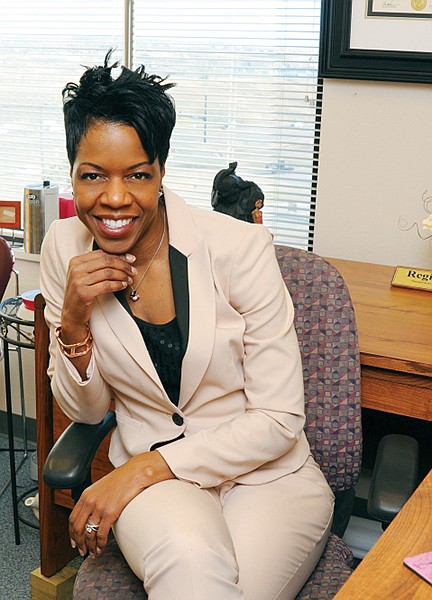Regina Lewis asked Lincoln University faculty and staff members Friday how they would feel if they had raised money for and donated a refrigerator to a poor family with a diabetic child who needed to keep insulin cold - only to discover a month later the family had replaced the refrigerator with a big-screen television.
"So many of us have different reactions to that, and it's about where did this come from? What is the thinking behind it?" Lewis told LU's Faculty-Staff Fall Institute, after giving the audience a chance to discuss the question among themselves.
"I hear many different things" about that family, she said. "But, did we really stop and think about that family?
"First of all, they didn't ask you for that refrigerator. (And) that television is going to serve more people in that family than that refrigerator because, if they can't afford a refrigerator, they possibly can't afford the food to put in that refrigerator."
Lewis has a doctorate in educational leadership, research and policy.
But she grew up in poverty before earning her doctorate and her earlier degrees in communications and psychology. She now heads the Communications, Humanities and Technical Studies division of Pikes Peak Community College in Colorado Springs, Colorado.
Lewis also is an inspirational speaker and came to Jefferson City to help Lincoln's faculty and staff understand how people raised in poverty often think differently from others in society - and how that could affect the teaching, counseling and other relationships LU employees may have with some students, especially those who are the first in their families to attend college.
Her goal, she told the News Tribune, is "that we need to build relationships of mutual respect."
Lewis was named one of 2015's "Women of Influence" by the Colorado Springs Business Journal, and its story about her noted, as the daughter of a soldier, she lived in a series of culturally diverse countries.
But she lived in poverty while her father fought in Vietnam.
And after her son's father was killed in an April 2001 airplane crash, Lewis raised her son Charles - now a U.S. Air Force Academy graduate stationed in Boston - as a single parent.
She juggled work, parenting and her education as she tried to get ahead.
Part of that struggle was her "problem with reading comprehension," she said, "writing sentences that were grammatically correct and not using a lot of slang - because that's who I was, that's what I knew (and) how I survived."
Lewis explained children raised in poverty start kindergarten knowing about 900 words, while middle class children begin school with around 1,200 words. Children raised in wealthy homes begin kindergarten knowing about 2,100 words.
There are a lot of those kinds of differences all people - especially teachers and others who work in education - should be paying attention to, Lewis told the LU Faculty-Staff Fall Institute.
People raised in poverty generally learn to "live for the moment," because they have no experience with planning for the future, she said.
"There is no clear understanding of the impact of choice," she said, because those living in poverty every day don't have a choice.
They are "concrete thinkers" who have "a disconnect with abstract" things.
And if something falls apart, Lewis explained, people in poverty don't go to the nearest service center or store but "depend on relationships to keep things going."
At the same time, middle class people generally have lives "based on achievement, (where) you're going to respond and react to things differently" than those raised in poverty.
Most of society is built on the middle class achievement model, making success easier for those who understand the idea, she said.
And among the wealthy, she said, the "core is connections. It's about who knows you and how do they know you?"
Lewis said a second major hurdle is society's hidden rules, and all of us generally understand the "hidden rules of the class in which (we were) raised."
But we don't generally understand those hidden rules of the other classes.
"We have to train our students to use them differently," Lewis said.
Many people fail to escape poverty, she said, because the rules work against them - just as earning more money causes a quicker decline in benefits, so greater income leads to greater debt rather than success in getting off welfare.
"The truth of the matter is, the more support that we have, the better that it is," she told a reporter - and it's not laziness, but lack of support from others that makes it difficult for most people to stop being poor.
Although she spent 90 minutes delivering her message Friday morning and spent more time in small-group workshops helping the LU staff deal with potential issues they may face with some students, Lewis told the News Tribune: "I believe that the message is for everyone."

